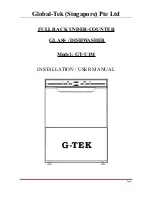
14
BEFORE YOU CALL
Dishware Stained or Discolored
•
Tea and coffee can stain cups.
Remove the stains by hand washing in
a solution of 1/2 cup (120 ml) bleach
and one quart (1L) of warm water.
Rinse thoroughly.
•
Iron deposits in water can cause a
yellow or brown film. A special filter
installed in the water supply line will
correct this problem. (See Removing
Spots and Film).
•
Aluminum utensils can leave gray/
black marks when they rub against
other items. Load Properly.
•
Certain high acid foods can cause
discoloration of stainless steel and
plastics if allowed to sit for a long
period. Use the Rinse Only cycle
or rinse by hand if not operating
dishwasher at once.
•
Mixing stainless steel and silver
utensils in silverware basket can cause
pitting of the stainless steel blades.
Avoid mixing stainless steel and silver.
Etching
•
Using too much detergent especially
in soft or softened water causes
damage that looks like a film but
cannot be removed.
•
Adjust the amount of detergent
based on the water hardness. (Check
Detergent Chart).
•
Lower the water temperature
by selecting one of the lower
temperature options.
Detergent Left in Cups
•
Detergent may be old. Discard and
use fresh detergent.
•
Be sure the dish load doesn’t block
spray from entering the detergent
cup.
•
Check to see if cycle has been
completed.
•
Make sure items do not prevent the
detergent dispenser from opening.
Dishwasher Leaks
•
Check that the door gasket is pressed
into its mounting channel, reaches to
the bottom of the tub and does not
extend beyond the end rib so as to
interfere with door closure.
•
Spilled rinse aide can cause foam and
lead to overflowing. Wipe up any
spills with a damp cloth.
•
Check to see that the dishwasher is
level. (See Installation Instructions).
•
Avoid oversudsing by using the
correct amount of detergent designed
for automatic dishwashers.
•
Check to see that dishwasher is level.
(See Installation Instructions).
Water in Bottom of Tub
•
Water left in the tub bottom after
the cycle is complete is not normal.
If water remains in the bottom of
the tub, the dishwasher may not be
draining properly. (See Dishwasher
Does not Drain Properly).
Cycle Takes a Long Time
•
The cycle may have been automatically
lengthened to reach key temperatures
due to some factor such as a cool water
supply or a large load of dishes.
•
Delay Start option may have been
selected.
•
Choose lower temperature options to
shorten the cycle.
•
Cycles that are soil-sensing adjust
automatically to assure a good wash
- heavier soils will elicit a longer cycle
response.
Vapor at Vent
•
Spilled rinse aid can cause foam and
lead to overflowing. Wipe up any spills
with a damp cloth.
Normal Sounds You Will Hear
•
Normal sounds include water fill,
water spray, draining and motor
sounds.
•
There is a noticeable change in
sound when the wash action switches
between the lower and middle spray
arm. This is normal since each spray
arm has its own sound.
•
It is normal for the dishwasher to
pause (no sound) when the wash
action is switching between the lower
and middle spray arms.


































